july-top.html
1917 Francis Edward Ledwidge died on this day in 1917. He was an Irish soldier fighting in the British Army and was killed in Ypres when an enemy shell landed just feet from him. Ledwidge was an Irish nationalist and had been a member of the United Irishmen.
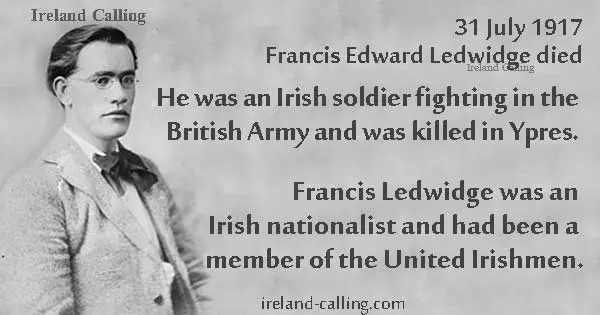
When the First World War broke out, the organisation was split between those who wished to fight for Britain and those that didn’t. Ledwidge decided to fight despite initially deciding not to. There are theories that Ledwidge decided to fight after he lost his sweetheart to another man, but he always denied this was his motivation.
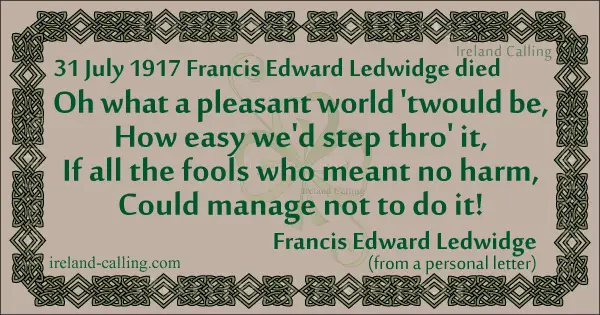
Ledwidge is most famous for his poetry. He was a talented writer and once he went to war, he had a plenty of emotion and passion to express in his poetry. One of his most famous poems is Lament for Thomas McDonagh. McDonagh was a close friend of Ledwidge and was one of the Easter Rising rebels who were executed by the British authorities. Had Ledwidge not chosen to fight in the World War then he could well have been alongside McDonagh and the other Rising leaders.
Lament for Thomas McDonagh was voted as one of Ireland’s favourite poems in a 1999 survey carried out by the Irish Times. Another of Ledwidge’s poems, June, was also named as one of the nation’s favourites.
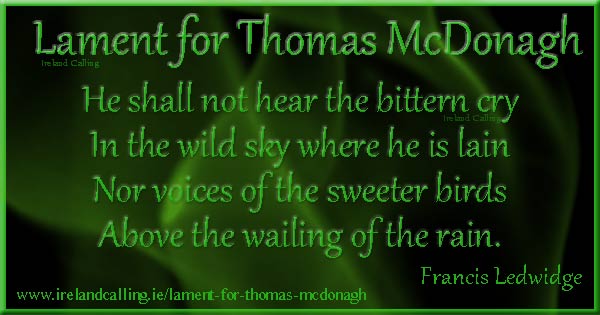
Click here to read the poem Lament for Thomas McDonagh
Click here to read the poem June
Click here to see the full list of Ireland’s 100 favourite poems
Click her to read more about the Easter Rising
* * *
1922 Harry Boland was shot by Free State soldiers on this day in 1922. He was a member of the anti-treaty IRA and his hotel room was stormed by the Free State soldiers. He was shot several times from point blank range despite being unarmed. Boland died from his injuries a few days later.
Boland’s death had a deep effect on the Free State leader Michael Collins. The two men had been close friends and allies during the War of Independence. They grew apart firstly after they both fell in love with the same woman, the beautiful Kitty Kiernan, and secondly when Collins signed the Anglo-Irish Treaty and Boland took the side of the IRA.
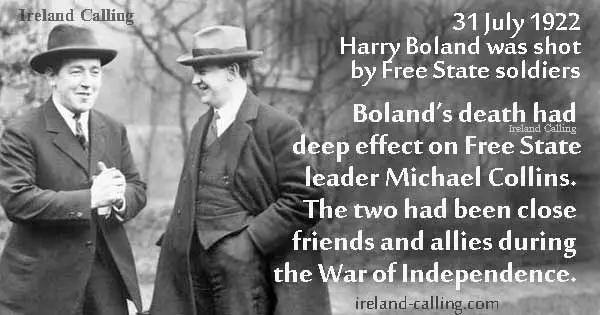
Despite the fact that the men had grown apart, Collins was still desperately hurt that his friend had been killed in such a way. He immediately upped his efforts to bring an end to the Civil War by negotiating a peace deal with the IRA.
Click here to read more about the Irish War of Independence
Click here to read more about the Irish Civil War
* * *
1964 Happy birthday to Jim Corr, born in Co Louth on this day in 1964. He is a talented songwriter and musician and is most famous for being the only male in the Irish family band the Corrs. Jim, along with his sisters Andrea, Caroline and Sharon were hugely successful in the 1990s and 2000s with hits such as Breathless, So Young and Runaway.
Click here to read more about the Corrs
Click here to read about other great Irish bands
* * *
2007 This day in 2007 was a hugely significant day in the history of Northern Ireland. The final remaining British troops were withdrawn from the streets of Belfast and the rest of the country. Operation Banner was the name of the British Army’s peace-keeping presence in Northern Ireland throughout the Troubles.
There had been a military presence in the country for 38 straight years. The Troubles was the most violent and traumatic period in the country’s history, with various paramilitary groups carrying out attacks on each other, the army and often the general public.
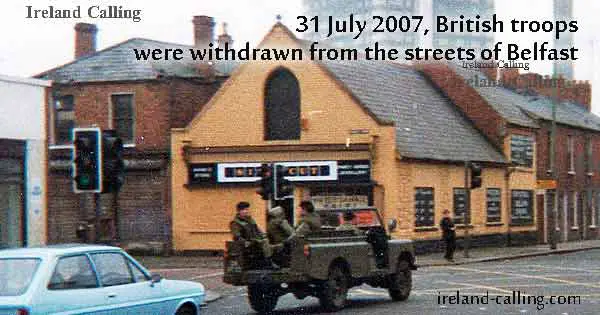
Thousands of people lost their lives throughout the period, and many young people even chose to leave their country for a better life elsewhere.
In 2007, nearly as decade after the Good Friday Agreement had been signed, the British soldiers were finally removed from Northern Ireland.
july-bottom.html